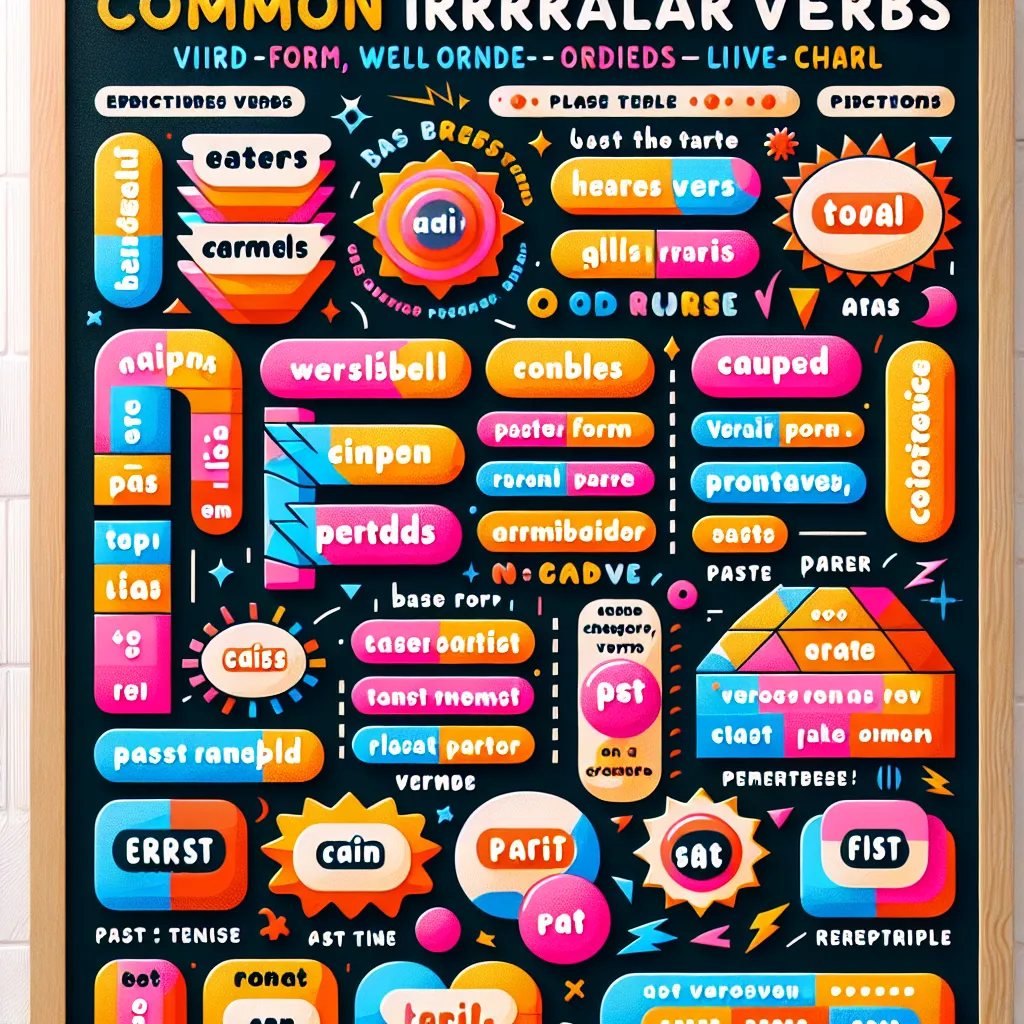Irregular verbs are a crucial aspect of English grammar that often pose challenges for language learners. Unlike regular verbs that follow a predictable pattern when conjugated, irregular verbs change in unpredictable ways. Mastering these verbs is essential for achieving fluency in English. In this article, we’ll explore effective methods for learning irregular verbs, providing you with strategies to enhance your language skills.
Understanding Irregular Verbs
Irregular verbs are verbs that do not follow the standard rules of conjugation. While regular verbs typically add “-ed” to form the past tense and past participle, irregular verbs change their form in various ways. For example:
- Go → Went → Gone
- Eat → Ate → Eaten
- Sing → Sang → Sung
Learning these verbs is crucial because they are frequently used in everyday communication and are often essential for expressing past actions and experiences accurately.
 Irregular Verbs Chart
Irregular Verbs Chart
Effective Methods for Learning Irregular Verbs
1. Categorization and Pattern Recognition
One of the most effective ways to learn irregular verbs is by categorizing them based on similar patterns. While they don’t follow the regular “-ed” rule, many irregular verbs do share common patterns. For instance:
- Verbs that don’t change: hit → hit → hit, cut → cut → cut
- Verbs that change vowels: sing → sang → sung, drink → drank → drunk
- Verbs ending in “-ght”: catch → caught, teach → taught
By grouping verbs with similar patterns, you can reduce the number of individual forms you need to memorize.
2. Mnemonic Devices
Creating mnemonic devices or memory aids can be an excellent way to remember tricky irregular verbs. For example:
- “I hit the ball, I hit the ball yesterday, and I have hit the ball many times before.”
- “I go to school, I went to school yesterday, and I have gone to school for years.”
These simple sentences can help you remember the different forms of the verb in context.
3. Flashcards and Spaced Repetition
Flashcards are a time-tested method for learning vocabulary and grammar. Create flashcards with the base form of the verb on one side and its past and past participle forms on the other. Use these in conjunction with a spaced repetition system (SRS) to optimize your learning.
For more tips on using flashcards effectively, check out our article on how to practice English grammar with flashcards.
4. Contextual Learning
Learning irregular verbs in context is crucial for understanding how to use them correctly. Read English texts, listen to podcasts, or watch movies and TV shows in English. Pay attention to how irregular verbs are used in real-life situations. This method not only helps with memorization but also improves your overall language comprehension.
 Contextual Learning of Irregular Verbs
Contextual Learning of Irregular Verbs
5. Practice Through Writing and Speaking
Actively using irregular verbs in your own writing and speech is essential for mastery. Try these exercises:
- Write short stories using specific irregular verbs.
- Keep a journal and deliberately use irregular verbs to describe your day.
- Practice speaking with a language exchange partner, focusing on using irregular verbs correctly.
For more in-depth practice with verb forms, visit our article on deep dive into English verb forms.
6. Gamification and Apps
Many language learning apps incorporate games and interactive exercises to make learning irregular verbs more engaging. Apps like Duolingo, Quizlet, and Memrise offer specific modules for practicing irregular verbs. These can be particularly helpful for visual and kinesthetic learners.
7. Verb Tables and Charts
Create or use existing verb tables and charts that list irregular verbs and their forms. Having a visual reference can be extremely helpful. You can create your own chart or find comprehensive ones online or in English grammar books.
Common Mistakes to Avoid
When learning irregular verbs, be aware of these common pitfalls:
- Overgeneralization: Avoid applying regular verb rules to irregular verbs (e.g., “goed” instead of “went”).
- Mixing up similar verbs: Be careful with verbs that sound similar but have different forms (e.g., lie/lay, rise/raise).
- Neglecting the past participle: Remember that many irregular verbs have a distinct past participle form used in perfect tenses.
Next Steps
Once you’ve familiarized yourself with the most common irregular verbs, consider these next steps:
- Take a practice test to assess your knowledge.
- Challenge yourself to use a certain number of irregular verbs in conversation each day.
- Read advanced texts to encounter less common irregular verbs.
- Study the etymologies of irregular verbs to understand why they don’t follow regular patterns.
For more strategies on mastering English grammar without getting bored, check out our article on how to learn English grammar without getting bored.
Conclusion
Learning irregular verbs is a crucial step in mastering English grammar. By employing a combination of categorization, mnemonic devices, contextual learning, and consistent practice, you can effectively memorize and use irregular verbs with confidence. Remember that learning is a process, and consistency is key. Keep practicing, and you’ll see improvement in your English skills over time.
We encourage you to share your own techniques for learning irregular verbs in the comments below. What methods have worked best for you? Your insights could be invaluable to other learners on their language journey!




